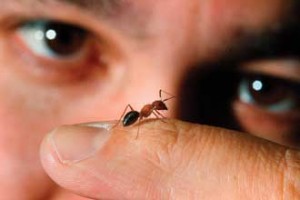
By Mark Shainblum
We make war, enslave our enemies and police the sexual behavior of others. Are we humans? No, explains McGill evolutionary biologist Ehab Abouheif, we’re ants.
Abouheif didn’t start his career in evolutionary biology with a burning desire to study ants. In fact, as a PhD candidate at Stony Brook University in Long Island, his initial focus was on fish. However, when his doctoral advisor was hired away by a university in Germany, Abouheif elected to stay at Stony Brook and complete his doctorate with another advisor.
“I’d just written a series of papers on making broad evolutionary comparisons on totally unrelated species, like flies, starfish and humans,” Abouheif said. “That was very unsatisfying and I wanted to zoom in and focus on a particular species up close. My advisor and I started talking about different options: termites, aphids, ants… As soon as I said ‘ants,’ we stopped and looked at each other. That was the ‘bingo!’ moment, and I knew I wanted to study ant evolution.”
The old man of the ants
Putting that into action, though, was a bit harder, Abouheif explained. “I immediately picked up a spoon and ran outside looking for ant hills,” he said. “I scooped up one pile of dirt after the other…and it was a miserable failure. I couldn’t find anything useful for the life of me,” he said. Abouheif was near despair when he heard about Ray Sanwald, a Long Island denture maker in his 70’s with only a high school education.
“Ray is an amateur biologist,” Abouheif said. “He owns three acres of land, and for the last 50 years has been rigorously studying the slave-raiding behavior of ants. He knows every single ant on Long Island: where to find specific species, how to catch them, you name it. He taught me everything I know about collecting ants.”
In particular, Abouheif wanted to collect samples of the ant species chromogaster, and Sanwald agreed to help him find them.
“We drove to an old Big K department store, and went around to the back, were we found an abandoned car,” he said. “Ray started pulling the carpets off the floor of the car, and out poured this huge wave of ants.”
News flash! Ants torment Charles Darwin
Ants are a particularly rich area of study for evolutionary biology, because their reproductive strategies at first seemed to be a rebuke to Charles Darwin’s theories of natural selection.
Ants – organized in colonies around a single fertile queen surrounded by thousands of sterile female workers – are classic examples of eusocial organisms. These societies typically feature reproductive division of labour (usually with a sterile caste), overlapping generations and cooperative care of the young.
“However, this posed a dilemma for Darwin’s theory,” Abouheif explained. “If adaptive evolution unfolds by differential survival of individuals, how can individuals incapable of passing on their genes possibly evolve and persist? Darwin himself called ants the ‘one special difficulty, which at first appeared to me insuperable, and actually fatal to my theory.'”
Many theories have been advanced to solve the ant/evolutionary problem over the years, but Abouheif and his graduate student Abderrahman Khila may have finally put the matter to rest with a study published in the Proceedings of the National Academy of Sciences in late 2008. They theorized that evolutionary forces jump from acting on individuals to a group-centric “superorganism” as ant species become more advanced, a process called “reproductive constraint.”
“Different species of ants have different levels of this reproductive constraint, and we believe those levels measure how social the colony will be,” Abouheif said. “The less the workers reproduce, the more unified the group becomes. In these species, which can think of natural selection applying not to the individual, but to the family or ‘superorganism’ level. We can look at the entire colony as a single organism.”
In 2004, Abouheif returned to Montreal, his hometown, drawn to McGill in a great wave of recruitment at the Faculty of Science spearheaded by Dean Martin Grant.
“I was very fortunate to come to McGill at that period, because there was such a renaissance,” Abouheif said. “Most of my colleagues are very young professors, but there’s actually a perfect mix of some of the older professors with experience, plus the infusion of new blood coming in.”
